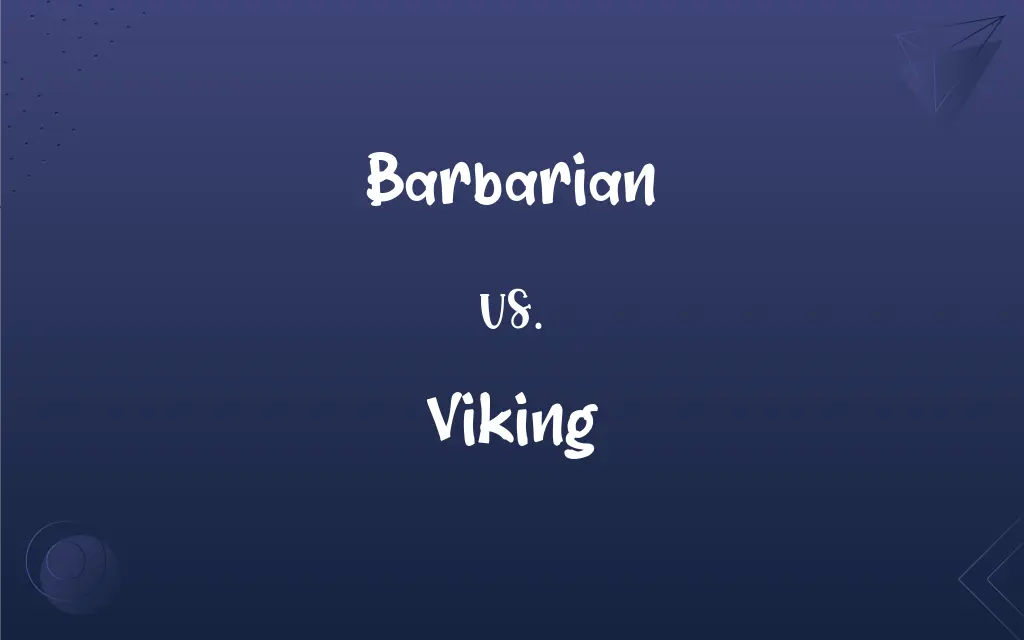Barbarian vs. Viking: What's the Difference?
Edited by Aimie Carlson || By Janet White || Updated on September 18, 2023
A barbarian is a term historically used to describe someone perceived as uncivilized or primitive, often used in a derogatory manner. A Viking is specifically a seafaring Norseman active primarily between the late eighth and early 11th centuries.

Key Differences
The term "barbarian" is a broad label that has been used to describe people or groups considered uncivilized or primitive. This term is often pejorative, used by "civilized" societies to describe others whom they consider inferior. In contrast, a Viking refers specifically to seafaring Norsemen from the Scandinavian region, who lived between the late eighth and early 11th centuries. Vikings were not simply barbarians; they had their own complex social systems and craftsmanship.
Barbarians could belong to various tribes and regions, like the Goths, Vandals, or Mongols, and were not limited to a specific era. Vikings, on the other hand, have a particular geographical and temporal identity. They hailed from places we now know as Norway, Denmark, and Sweden. While Vikings could be considered barbarians by the societies they raided, the term "Viking" has specific implications related to seafaring and exploration.
From a linguistic standpoint, "barbarian" comes from the Greek "barbaros," meaning someone who does not speak Greek, hence considered uncivilized. Vikings got their name from the Old Norse term "víkingr," signifying a pirate or raider. The plural form of barbarian is "barbarians," and for Viking, it's "Vikings."
Grammatically, both "barbarian" and "Viking" function primarily as nouns but can also be used as adjectives. For instance, one might describe an act as "barbarian cruelty" or a ship as a "Viking vessel." The terms are distinct in scope, time frame, and cultural connotations, but are often misconstrued as interchangeable.
Comparison Chart
Temporal Scope
Timeless, general term
Late 8th to early 11th century
ADVERTISEMENT
Geographical Scope
Various tribes and regions
Scandinavia
Linguistic Origin
Greek "barbaros"
Old Norse "víkingr"
Plural Form
Barbarians
Vikings
Part of Speech
Noun, can be an adjective
Noun, can be an adjective
Barbarian and Viking Definitions
Barbarian
An uncivilized or primitive person.
He viewed his enemies as barbarians.
ADVERTISEMENT
Viking
A seafaring Norseman from the late 8th to early 11th century.
The Viking sailed to Greenland.
Barbarian
A non-Greek or Roman in ancient times.
The Roman Empire often fought against barbarians.
Viking
A person engaged in piracy or seafaring raids during the Viking Age.
The Viking was both a farmer and a warrior.
Barbarian
A crude or brutish individual.
His barbarian behavior shocked everyone.
Viking
A member of the Norse people.
The Viking hailed from Norway.
Barbarian
A member of a community not belonging to one of the great civilizations.
Barbarians invaded the kingdom.
Viking
A pirate or raider in the Old Norse tradition.
As a Viking, he raided coastal villages.
Barbarian
An uncultured person.
She considered anyone without an education a barbarian.
Viking
A Scandinavian explorer.
The Viking explored new lands.
Barbarian
A member of one of the non-Greek peoples in the ancient world, regarded by the ancient Greeks as culturally inferior.
Viking
One of a seafaring Scandinavian people who raided the coasts of northern and western Europe from the eighth through the tenth century.
Barbarian
A member of any of various peoples living outside the Roman Empire or not fully integrated into Greco-Roman civilization.
Viking
A Scandinavian.
Barbarian
A member of a people considered uncivilized or culturally inferior by members of another people.
Viking
One belonging to the pirate crews from among the Northmen, who plundered the coasts of Europe in the eighth, ninth, and tenth centuries.
Of grim Vikings, and the raptureOf the sea fight, and the capture,And the life of slavery.
Barbarian
A crude, uncivilized, or brutal person.
Viking
Any of the Scandinavian people who raided the coasts of Europe from the 8th to the 11th centuries
Barbarian
Relating to people, countries, or customs perceived as uncivilized or inferior.
Barbarian
(historical) A non-Greek or a non-Roman citizen.
Barbarian
An uncivilized or uncultured person, originally compared to the hellenistic Greco-Roman civilisation; often associated with fighting or other such shows of strength.
Barbarian
(derogatory) A person destitute of culture; a Philistine.
Barbarian
(derogatory) Someone from a developing country or backward culture.
Barbarian
A warrior, clad in fur or leather, associated with sword and sorcery stories.
Barbarian
A cruel, savage, inhumane, brutal person; one without pity or empathy.
Barbarian
(derogatory) A foreigner, especially with barbaric qualities as in the above definitions.
Barbarian
A foreigner.
Therefore if I know not the meaning of the voice, I shall be unto him that speaketh a barbarian, and he that speaketh shall be a barbarian unto me.
Barbarian
A man in a rude, savage, or uncivilized state.
Barbarian
A person destitute of culture.
Barbarian
A cruel, savage, brutal man; one destitute of pity or humanity.
Barbarian
Of, or pertaining to, or resembling, barbarians; rude; uncivilized; barbarous; as, barbarian governments or nations.
Barbarian
A member of an uncivilized people
Barbarian
A crude uncouth ill-bred person lacking culture or refinement
Barbarian
Without civilizing influences;
Barbarian invaders
Barbaric practices
A savage people
Fighting is crude and uncivilized especially if the weapons are efficient
Wild tribes
FAQs
What's the Origin of the Word Barbarian?
It originates from the Greek word "barbaros," meaning non-Greek or uncivilized.
What is a Viking?
A Viking is a seafaring Norseman active between the late eighth and early 11th centuries.
What's the Origin of the Word Viking?
It comes from Old Norse "víkingr," meaning a pirate or raider.
What Did Barbarians Do?
Activities varied, but they were often portrayed as raiders or conquerors.
Are Vikings Barbarians?
While Vikings could be considered barbarians by societies they raided, the term Viking is more specific.
What is a Barbarian?
A barbarian is often considered an uncivilized or primitive person.
Where Did Barbarians Live?
Barbarians could belong to various tribes and regions worldwide.
Can Barbarian Be Used as an Adjective?
Yes, such as in "barbarian practices."
Were All Vikings Warriors?
Many were warriors, but they were also traders and explorers.
How Did Vikings Dress?
They wore tunics, trousers, and fur-lined cloaks.
Where Did Vikings Live?
Vikings originated from Scandinavia.
Are All Barbarians Warriors?
Not necessarily; the term is more about perceived civilization level.
How Did Barbarians Dress?
Dress varied by region and time period.
Can Viking Be Used as an Adjective?
Yes, such as in "Viking ship."
What Did Vikings Do?
They were seafarers, traders, and raiders.
About Author
Written by
Janet WhiteJanet White has been an esteemed writer and blogger for Difference Wiki. Holding a Master's degree in Science and Medical Journalism from the prestigious Boston University, she has consistently demonstrated her expertise and passion for her field. When she's not immersed in her work, Janet relishes her time exercising, delving into a good book, and cherishing moments with friends and family.
Edited by
Aimie CarlsonAimie Carlson, holding a master's degree in English literature, is a fervent English language enthusiast. She lends her writing talents to Difference Wiki, a prominent website that specializes in comparisons, offering readers insightful analyses that both captivate and inform.































































